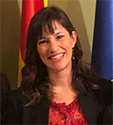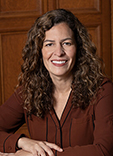Members
Working Group on discrimination against women and girls
Working Group letter on criteria for the appointment of members (Word)
Current members
Dorothy Estrada-Tanck (Mexico) Chair

Dorothy Estrada-Tanck is the Chair of the UN Working Group on discrimination against women and girls. She assumed her functions on 1 November 2020. Dorothy holds a PhD in Law from the European University Institute (Italy), an MSc in Political Theory from the London School of Economics and Political Science (United Kingdom) and a Law Degree from Escuela Libre de Derecho (Mexico). She is currently Assistant Professor of Public International Law and International Relations at the Faculty of Law of University of Murcia (Spain) and Director of its Legal Clinic. Her academic and professional activities have focused on international human rights law, human security, women’s rights, gender equality and violence against women, human rights of migrants and refugees, persons with disabilities, indigenous peoples, and economic, social and cultural rights. She holds 15 years of professional experience: Ministry of Foreign Affairs (Mexico); UN Office of the High Commissioner for Human Rights; Mexico City Human Rights Commission; UN Women/Mexican Supreme Court/Inmujeres; Case Matrix Network (Centre for International Law Research and Policy); and the NGO Fundación CEPAIM (Spain).
She has published extensively, including Human Security and Human Rights under International Law: The Protections Offered to Persons Confronting Structural Vulnerability (Hart Publishing, Oxford, 2016; Best Book Award 2017 of the Inter-American Bar Association, Washington, D.C.). She has taught and conducted research at institutions in Mexico, Italy, the U.S, Spain and Canada, including at Escuela Libre de Derecho, Universidad Iberoamericana (Mexico), Fordham School of Law (New York), IE Law School, ICADE (Madrid), the Centre for Human Rights and Legal Pluralism at the Faculty of Law of McGill University in Montreal (as O’Brien Fellow in Residence), and as Visiting Fellow at the Human Rights Program of Harvard Law School.
Ivana Krstić (Serbia)

Ivana Krstić assumed her functions as member of the UN Working Group on discrimination against women and girls on 1 November 2023. She is a full professor at the Faculty of Law, University of Belgrade, where she teaches International Human Rights Law and other related courses at the Department of International Law and International Relations. She obtained her LLM (2003) at the School of Law, University of Pittsburgh (USA), along with an LLM (2004) and Ph.D. (2008) at the University of Belgrade Faculty of Law. In the academic year 2006/2007, she was a Chevening Scholar working on her dissertation at Exeter College, Oxford University. She is the director of the Center for Human Rights and the Institute for Legal and Social Sciences of the Faculty of Law. She coordinates the Legal Clinic for Anti-discrimination Law, as well as the group of experts of the Faculty of Law, which aims to supervise the implementation of the Istanbul Convention on preventing and combating violence against women and domestic violence. She is a member of the LAWGEM (Law and Gender) and LAWGID (Law and Gender, Intersectionality and Diversity) team that prepared a research-strategic study for achieving gender equality at the Faculty of Law and prepares the special master program on gender mainstreaming in all legal disciplines.
As a leading Serbian expert in the area of human rights, she provided expert support in shaping domestic anti-discrimination legislation and policy documents and has been engaged in many projects run by several international organizations and agencies, such as OHCHR, UNHCR, UNDP, UNICEF, CoE, OSCE. Since 2015, she is a member of the European Equality Law Network (EELN) for both streams: non-discrimination and gender equality, as well as a Co-Rapporteur of the Country Report for Serbia in the Oxford Compendium of National Legal Responses to COVID-19. She is one of the editors-in-chief of the Springer edition “Gender Perspectives in Law” and participates in the project Feminist Judgments in Central and Eastern Europe. She extensively publishes in the areas of non-discrimination, gender equality, and refugee law. She is a newly appointed Sergio Vieira de Mello Chair Coordinator for the Faculty of Law, University of Belgrade. Her special area of interest is the role of gender bias in judicial decision-making, as well as a gender perspective in forced displacement.
Haina Lu (China)

Dr. Haina Lu assumed her functions as member of the UN Working Group on discrimination against women and girls on 1 November 2023. She is Professor at the Renmin University of China Law School and the Executive Director of the Human Rights Center of the Renmin University of China. Dr. Lu is also a member of the Human Rights Lawyers’ Network of the Law Association for Asia and the Pacific (LAWASIA).
She obtained a PhD in law from the Catholic University of Leuven (KUL) of Belgium, a Master’s degree in international law from the Liberal University of Brussels (ULB), an M.A. from the Norwegian Center for Human Rights, and a B.A. from the Foreign Affairs College of China.
Her research is focused on women’s rights, gender and law, the right to work, employment discrimination, labor-dispute resolution, and the rights of migrants and refugees. She published extensively both in English and in Chinese, in journals such as the Netherlands Quarterly of Human Rights and the Human Rights Quarterly. She authored a book in English: Right to Work in China: Labour Legislation in the Light of the International Covenant on Economic, Social and Cultural Rights (2011), and published two books in Chinese: National Protection of the Equal Right to Work: An International Law Perspective (2015) and Big Data, AI and Women’s Rights to Work (2021).
Claudia Flores (United States of America)

Claudia Flores assumed her functions as member of the UN Working Group on discrimination against women and girls on 1 November 2023. She is a Clinical Professor of Law at Yale Law School and Director of the Allard K. Lowenstein International Human Rights Clinic. She is also Director of the Law School’s Orville H. Schell, Jr. Center for International Human Rights. Flores’s teaching, scholarship and law practice have focused on international human rights, constitutional reform, global inequality, and state accountability for failures of good governance. She is co-host of Entitled, a podcast that explores global debates around human rights. Prior to joining YLS, Flores was a Clinical Professor of Law at the University of Chicago Law School and Director of the Global Human Rights Clinic.
Flores and her students have represented clients and partnered with advocates on a wide range of global human rights issues. Recent matters include representing household and care workers before the Inter-American Commission for Human Rights and documenting regional and state responses to online hate speech in conflict settings. Flores and her students’ work has been featured in the Washington Post, New York Times, Guardian, Chicago Tribune, and various network television and public radio outlets.
Flores’ scholarship has appeared in the Chicago Journal of International Law, University of Chicago Legal Forum, Georgia Journal of International and Comparative Law and Cardozo Journal of Law and Gender. She has contributed book chapters to Gender and Constitutional Law (Catharine MacKinnon, ed., 2018) and From Parchment to Practice: Implementing New Constitutions (Tom Ginsburg & Aziz Z. Huq eds., 2020).
Before joining academia, Flores’ legal practice included both domestic litigation and international advocacy. From 2013-2015, she was a partner in the civil rights practice of Hughes, Socol, Piers, Resnick and Dym and served as lead attorney in collective and class action labor and employment cases on behalf of agricultural workers in temporary foreign labor programs. She served a four-year term as a UN Women and United Nations Development Programme (UNDP) legal advisor to the governments of East Timor and Zimbabwe. She also managed a USAID-funded program to combat human trafficking in Indonesia. From 2004-2008, Flores was a staff attorney in the Women’s’ Rights Project of the national office of the American Civil Liberties Union. There, she spearheaded litigation and advocacy to advance workplace rights of low-wage immigrant women workers.
Flores received her B.A. in philosophy from the University of Chicago and J.D. from New York University where she was a Root-Tilden-Kern Public Interest Scholar and Sinsheimer Service Fellow. Following graduation, Flores was a Skadden Arps Fellow in the International Women’s Human Rights Clinic at CUNY Law School. Flores clerked for Judge Harry Pregerson in the U.S. Court of Appeals for the Ninth Circuit.
Laura Nyirinkindi (Uganda)

Laura Nyirinkindi assumed her functions as member of the UN Working Group on discrimination against women and girls on 1 November 2023. Ms. Nyirinkindi holds a master’s degree in international human rights Law from the University of Oxford, United Kingdom and a Law Degree from Makerere University, Uganda. She is a Senior Managing Consultant of Pro Initiatives Agency, a human rights firm based in Uganda. Ms. Nyirinkindi assumed leadership positions in civil society organisations in Africa, Europe and America as a means to mainstream women’s rights in the human rights movement. She served on the African Development Bank’s Civil Society Committee where she advocated for gender inclusive socio-economic development on the continent. She is currently the Africa Regional Vice President of the International Federation of Women Lawyers (Federación Internacional de Abogadas), promoting transboundary advocacy and common action around shared values and objectives on the rights of women and girls globally.
Ms. Nyirinkindi specialises in women’s rights, gender equality, governance, and the rule of law. Her earlier career activities focused on grassroots legal education and aid, and strategic litigation for vulnerable women, girls and marginalised and disadvantaged groups. Over 17 years she has dedicated her efforts to promoting social justice through advocating for enabling policies and laws, research, documentation, training and capacitating states and communities around key actions on women's and girl’s rights, access to justice, gender-inclusive democratic governance, women, peace and security, gender-based violence, persons with disabilities, displaced persons, and rights-based approaches to development. She has worked in 36 countries, collaborating with African Union institutions like the Africa Peer Review Mechanism and United Nations agencies such as UN Women, UNICEF, UNHCR, OHCHR and national human rights commissions. Ms. Nyirinkindi taught international human rights law at the university level in Uganda and has published several articles on the rights of women in Africa.
Former members
Ms. Ivana Radačić (Croatia) (2017-2023)
Ms. Melissa Upreti (Nepal/USA) (2017-2023)
Ms. Elizabeth Broderick (Australia) (2017-2023)
Ms. Meskerem Geset Techane (Ethiopia) (2017-2023)
Ms. Emna Aouij (Tunisia) (2010-2017)
Ms. Kamala Chandrakirana (Indonesia) (2010-2017)
Ms. Alda Facio (Costa Rica) (2014-2020)
Ms. Frances Raday (Israel/United Kingdom) (2010-2017)
Ms. Eleonora Zielinska (Poland) (2010-2017)
Ms. Patricia OLAMENDI TORRES (Mexico) (2012-2013)
Ms. Mercedes Barquet (Mexico) (2011-2012)